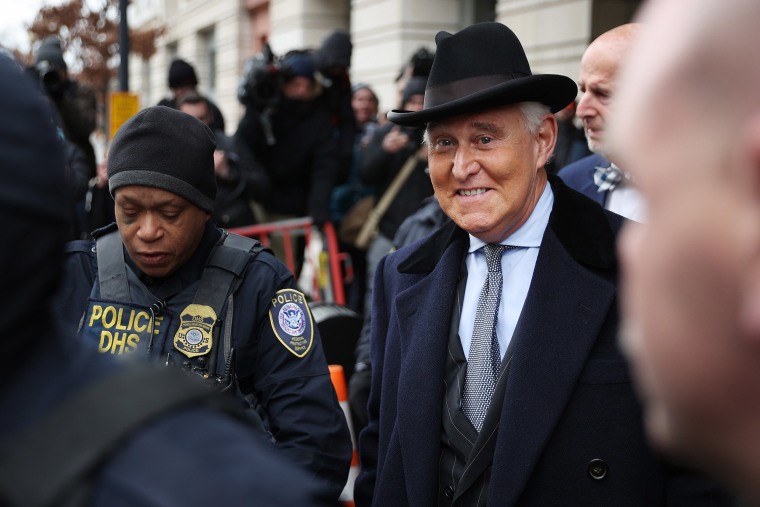Donald Trump has repeatedly and scandalously intervened in the criminal cases of the politically connected, but the president's commutation for Roger Stone -- issued exactly two weeks ago today -- was qualitatively worse.
It was among the most brazenly corrupt steps Trump has taken while in office, featuring a president rescuing a convicted felon who lied on his behalf as part of a broader cover-up. A Washington Post editorial called Stone's commutation "one of the most nauseating instances of corrupt government favoritism the United States has ever seen." The editorial board added, "If the country needed any more evidence, Friday confirmed that the greatest threat to the Republic is the president himself."
The timing, however, remains of interest. Trump delayed his debased action until late on a Friday night -- the president's preferred time to try to bury scandalous announcements. My hope was that the corruption was so outrageous that the resulting scandal would resonate for a long while.
That's not what happened. The latest NBC News/Wall Street Journal poll found that only 16% of Americans agreed with Trump's commutation of Stone, but 47% of Americans didn't know enough about the story to even have an opinion.
This not only bolsters the political merits of the Friday-night-news-dump tactic, it also leads Trump to believe he can get away freely with similarly pernicious acts.
President Trump on Thursday said he would consider granting pardons for individuals implicated in former special counsel Robert Mueller's investigation. "I’ve looked at a lot of different people. They’ve been treated extremely unfairly, and I think I probably would, yes," Trump told Sean Hannity on Fox News.
It's outrageous, but unsurprising. Trump has been abusing his pardon and commutation powers in indefensible ways throughout his presidency, culminating in the Stone disaster two weeks ago. But from Trump's perspective, the blowback was relatively muted; the political effects were minor; and the real-world consequences were non-existent.
All of which, of course, left the president feeling emboldened to take even more steps down the same crooked road.
To be sure, the developments have not gone unnoticed on Capitol Hill. In fact, the New York Times reported overnight that the House Democratic majority, still infuriated by Trump's Stone commutation, are advancing legislation "that would give lawmakers new authority to scrutinize uses of executive clemency involving presidential family members or crimes against Congress and explicitly outlaw presidents from pardoning themselves."
Democrats on the Judiciary Committee said Thursday that Mr. Trump’s general willingness to test the limits of his powers and his particular commutation of Mr. Stone, a longtime friend who was found guilty of lying to and obstructing a congressional investigation into the president’s 2016 campaign and its ties to Russia, made it necessary to act. At the same time, Democrats advanced legislation that would pause the statute of limitations on any federal offense committed by presidents or vice presidents during their time in office so they cannot escape charges that might be brought if they were not in the White House.
While it's heartening to see the House Judiciary Committee act, and it's likely the full House will follow suit, the odds are poor that Republicans will care. In fact, a week ago, House Minority Leader Kevin McCarthy (R-Calif.) endorsed Trump's intervention in Roger Stone's case, despite the fact the Republican operative lied to Congress.
With this in mind, even if House Dems tried to set some guardrails around presidential powers in this area, GOP leaders have already signaled their disinterest, dooming legislation in the Republican-led Senate.
That doesn't make Trump's abuses any less offensive, but it does suggest it will be up to voters to curtail them.

